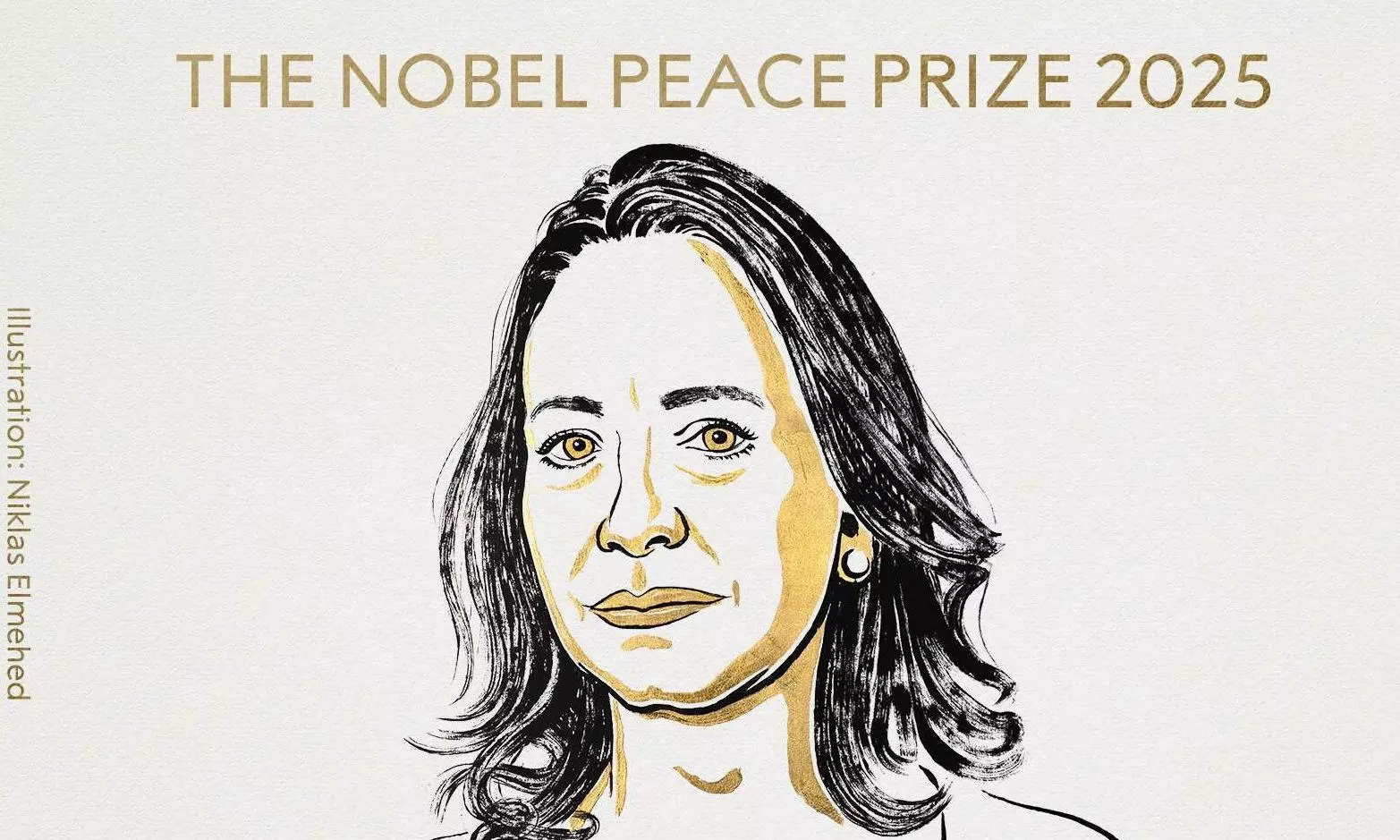
Despite serious threats against her life, Maria Corina Machado has remained in Venezuela. Illustration: @NobelPrize
Maria Corina Machado wins 2025 Nobel Peace Prize, Trump's hopes dashed
Maria Corina Machado wins the 2025 Nobel Peace Prize for her fight to promote democracy and human rights in Venezuela despite threats and persecution

Maria Corina Machado, a Venezuelan activist, has been awarded the 2025 Nobel Peace Prize for her work in promoting democratic rights in Venezuela.
“The Norwegian Nobel Committee has decided to award the 2025 #NobelPeacePrize to Maria Corina Machado for her tireless work promoting democratic rights for the people of Venezuela and for her struggle to achieve a just and peaceful transition from dictatorship to democracy. #NobelPrize,” stated a post on the official X handle of the Nobel Prize.
Remained in Venezuela despite threats
It further stated that despite severe threats to her life, Maria has remained in Venezuela even though she has been forced to live in hiding.
“In the past year, #NobelPeacePrize laureate Maria Corina Machado has been forced to live in hiding. Despite serious threats against her life, she has remained in the country, a choice that has inspired millions of people.” Stated the post.
“When authoritarians seize power, it is crucial to recognise courageous defenders of freedom who rise and resist. Democracy depends on people who refuse to stay silent, who dare to step forward despite grave risk, and who remind us that freedom must never be taken for granted, but must always be defended – with words, with courage and with determination,” stated the social media post.
Also Read: 10 must-read books by 2025 Nobel Prize in Literature winner László Krasznahorkai
Tireless work for democratic rights
According to a release issued by the Norwegian Nobel Committee, the Nobel Peace Prize for 2025 has been awarded to Maria because of her “tireless” work promoting democratic rights for the people of Venezuela and for her struggle to achieve a just and peaceful transition from dictatorship to democracy.
Describing her as “one of the most extraordinary examples of civilian courage in Latin America”, the release states that Maria has been a key, unifying figure in a political opposition that was once deeply divided.
Also Read: Hungarian writer Laszlo Krasznahorkai wins Nobel Literature 2025
United the Opposition
“Ms Machado has been a key, unifying figure in a political opposition that was once deeply divided – an opposition that found common ground in the demand for free elections and representative government. This is precisely what lies at the heart of democracy: our shared willingness to defend the principles of popular rule, even though we disagree. At a time when democracy is under threat, it is more important than ever to defend this common ground,” it added.
As for the challenges faced by Maria, the release states that ahead of the election of 2024 election, Maria was the opposition’s presidential candidate, but the regime blocked her candidacy.
“She then backed the representative of a different party, Edmundo Gonzalez Urrutia, in the election. Hundreds of thousands of volunteers mobilised across political divides. They were trained as election observers to ensure a transparent and fair election,” stated the release.
“Despite the risk of harassment, arrest and torture, citizens across the country held watch over the polling stations. They made sure the final tallies were documented before the regime could destroy ballots and lie about the outcome,” it added.
Also Read: Nobel Prize in Chemistry 2025 goes to Kitagawa, Robson, Yaghi
Trump's Nobel ambition
Last month, Trump had stated that his not being awarded the Nobel Peace Prize after resolving seven global conflicts would be an insult to the US.
During a meeting at Quantico with military generals, he expressed optimism about his 20-point peace plan aimed at ending the Israel-Hamas conflict in Gaza, which, if successful, would bring his total to eight resolved conflicts.
Despite this, Trump voiced scepticism about his chances of winning the award, predicting it would likely go to someone "who did not do a damn thing" and possibly a writer documenting his efforts. He emphasised that he does not personally desire the prize, but rather believes the

